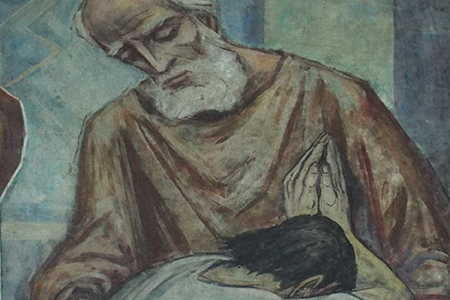 Joshua 5:9A, 10-12
Joshua 5:9A, 10-12
 2 Corinthians 5:17-21
2 Corinthians 5:17-21
 Luke 15:1-3, 11-32
Luke 15:1-3, 11-32
In this 4th Sunday of Lent, we have a great privilege to read Jesus' greatest parable, the Tale of the Prodigal son. It reminds me of the book, The Return of the Prodigal Son by Henri Nouwen. It depicts every fine detail and the spiritual reflections of the magnificent painting of the same name by Rembrandt. It is such a wonderful and most enjoyable book which I have read. It is the greatest story ever told that speaks so eloquently of who God is, and how we may nurture a right relationship with Him.
As Jesus begins the parable, we hear that the younger son, who represents a sinner, egre-giously insults his father by demanding his inheritance immediately. "Give me my share of your estate that should come to me" (Lk 15:12). Three times he has emphasized “Me”, which is heart of the problem. The father, who is oblivious to the insult, gives the boy exactly what he wants. It underlines a deeper spiritual meaning, in which many of us want the gifts of God (good life, success, health, and love) as our own possessions without a right relationship with the giver. This will never work spiritually. Our God, a transcendental source, is the one who gives, and He exists in gift form. When we wander away from the source and refuse to acknowledge it, the gifts dry up. This is when the younger son wanders into a space, "chóra makros" in Greek, meaning "a great wide emptiness". This is where we go to when we wander away from the source. The parable further lays out this state of moral deterioration, "a severe famine struck that country..., but nobody gave him any" (Lk 15:14-16). As if his spiritual emptiness is not enough, a famine breaks out that highlights his poverty, both physical and spiritual, more poignantly. This spiritual language shows that when we divorce from God, we will have no life. In fact, we will become less than human, "to eat his fill of the pods on which the swine fed" (Lk 15:16). Furthermore, in this "chóra makros", no one would give him anything as he wanders into the land of calculation, contract, and exchange. In contrast, it is the land of rich graciousness and gratuitous giving where his father lives!
Having hit bottom, the young boy “went back to his father” (Lk 15:20). As we are all sin-ners, we find ourselves many times in this space throughout our life. We may be living a materially rich life but divorce from God, or on a path of self-indulgence but have hit rock bottom, like the prodigal son. This is the land where we wander into, and we inevitably dry up. The key is that we have to decide to return. God is love, but because of his gracious love, He always respects our freedom. Without freedom, our lives would not be ours. Therefore, it is a decisive and an absolutely indispensable process to muster the freedom, the courage, and the energy, to turn back. Grace floods the moment when this happens. All these times the father has been waiting and watching, and the moment when he sees him, “he runs to his son” (Lk 15:20). How embarrassing it is! In Jewish tradition, an older man would sit, and people would come to him. For an old man to run is extremely undignified, so is our God, full of grace! He embraces the young man and says, "bring the finest robe and put it on him; put a ring on his finger" (Lk 15:20). In the painting of "The Return of Prodigal Son", Rembrandt shows us that when the father puts his arms around his younger son, the light does not come from any sources outside, but it radiates out from the father himself. How beautiful! Our God lavishes his love on us, and he wants to bring us back into his circle of grace. This grace is above all joyful as it is a true celebration, a "big feast" as the parable describes. Jesus says, "I have told you this so that my joy may be in you and your joy may be complete" (Jn 15:11). That is the attitude of the father. The Bible is a story of God who relentlessly pursues for us. Our God, who wants nothing more than to bring us back into the circle of grace, would humiliate himself, and go to any ridiculous streams to "seek the lost, bring back the strays" (Ezk 34:16).
Are we ready to enter into the rhythm of grace? Are we ready to respond to this Father, who wants nothing more for us than to become fully alive? Let this rich parable sink in, wash over us, move us into the dynamics of the story, and illuminate where we are spiritually.
Acknowledgement
This is an excerpt from Bishop Robert Barron’s homilies, including
“The Prodigal Son”, “The Father and the Son”, and “The Lesson of the Prodigal Son”. For more information, please visit WordOnFire.org.
